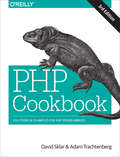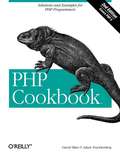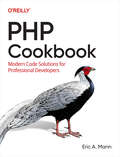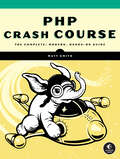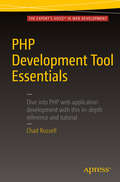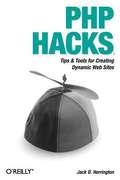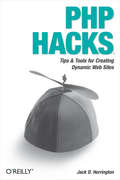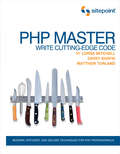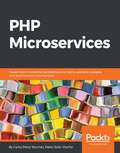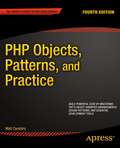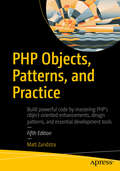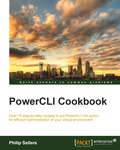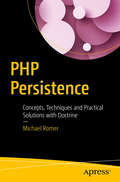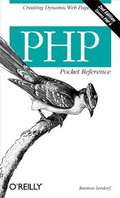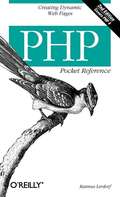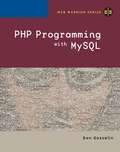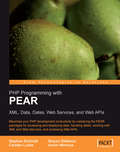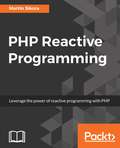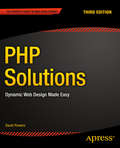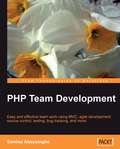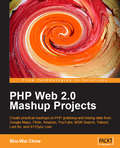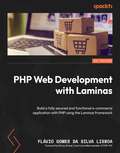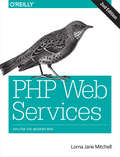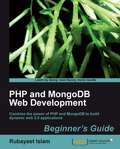- Table View
- List View
PHP Cookbook
by David Sklar Adam TrachtenbergWhen it comes to creating dynamic web sites, the open source PHP language is red-hot property: used on more than 20 million web sites today, PHP is now more popular than Microsoft's ASP.NET technology. With our Cookbook's unique format, you can learn how to build dynamic web applications that work on any web browser. This revised new edition makes it easy to find specific solutions for programming challenges. PHP Cookbook has a wealth of solutions for problems that you'll face regularly. With topics that range from beginner questions to advanced web programming techniques, this guide contains practical examples -- or "recipes" -- for anyone who uses this scripting language to generate dynamic web content. Updated for PHP 5, this book provides solutions that explain how to use the new language features in detail, including the vastly improved object-oriented capabilities and the new PDO data access extension. New sections on classes and objects are included, along with new material on processing XML, building web services with PHP, and working with SOAP/REST architectures. With each recipe, the authors include a discussion that explains the logic and concepts underlying the solution.
PHP Cookbook, 2nd Edition
by David Sklar Adam TrachtenbergWhen it comes to creating dynamic web sites, the open source PHP language is red-hot property: used on more than 20 million web sites today, PHP is now more popular than Microsoft's ASP.NET technology. With our Cookbook's unique format, you can learn how to build dynamic web applications that work on any web browser. This revised new edition makes it easy to find specific solutions for programming challenges. PHP Cookbook has a wealth of solutions for problems that you'll face regularly. With topics that range from beginner questions to advanced web programming techniques, this guide contains practical examples -- or "recipes" -- for anyone who uses this scripting language to generate dynamic web content. Updated for PHP 5, this book provides solutions that explain how to use the new language features in detail, including the vastly improved object-oriented capabilities and the new PDO data access extension. New sections on classes and objects are included, along with new material on processing XML, building web services with PHP, and working with SOAP/REST architectures. With each recipe, the authors include a discussion that explains the logic and concepts underlying the solution.
PHP Cookbook: Modern Code Solutions for Professional Developers
by Eric A. MannIf you're a PHP developer looking for proven solutions to common problems, this cookbook provides code recipes to help you resolve numerous scenarios. By leveraging modern versions of PHP through version 8.1, these self-contained recipes provide fully realized solutions that can help you solve similar problems in your day-to-day work.Whether you're new to development or merely new to PHP, these recipes will help you unpack the most powerful features of this programming language. Author Eric Mann, a regular contributor to php[architec magazine, frequently makes presentations on software architecture and has built scalable projects for startups and Fortune 500 companies alike.Learn the type system of modern PHPBuild efficient applications composed of functions and objectsUnderstand key concepts such as encryption, error handling, debugging, and performance tuningExplore the PHP package/extension ecosystemLearn how to build basic web and basic command-line applicationsWork securely with files on a machine, both encrypted and in plain text
PHP Crash Course: The Complete, Modern, Hands-On Guide
by Matt SmithFrom First Script to Full Website—Fast!Tired of cobbling together PHP solutions from scattered online tutorials? Frustrated by outdated PHP practices that leave your code vulnerable and hard to maintain? Whether you&’re building your first dynamic website or modernizing legacy systems, PHP Crash Course gives you a complete, practical foundation for writing professional web applications.In this comprehensive, example-driven guide, you&’ll learn how to:Write clean, maintainable PHP code using modern language features and best practicesBuild secure web applications that protect against common vulnerabilitiesMaster database integration using PDO and object-relational mappings (ORMs)Implement professional features like shopping carts and user authenticationStructure applications using object-oriented programming and model-view-controller (MVC) patternsLeverage powerful tools like Composer and Twig to accelerate development Starting with PHP fundamentals, you&’ll progress through six carefully crafted sections covering essential patterns, security best practices, database integration, and advanced concepts like object-oriented programming. Each chapter builds on real-world examples, giving you the skills to solve common development challenges.Whether you&’re a complete beginner or an experienced developer looking to modernize your PHP skills, PHP Crash Course gives you everything you need to build professional, dynamic websites with confidence.Includes setup instructions for Windows, macOS, and Linux, and configuration details for Replit, the free online development environment.
PHP Development Tool Essentials
by Chad RussellLearn PHP development best practices, such as version control, development environment virtualization, and coding standards. You'll also discover the most useful PHP web frameworks, including the new Laravel, symfony2, and micro-frameworks. As you do so, you'll learn how to use them to write the most productive PHP code possible. PHP Development Tool Essentials complements Jason Gilmore's best-selling Beginning PHP and MySQL. This in-depth "dive-in"-like book aims to further expose the reader into the many different methodologies, tools, and concepts that professional web developers are using more and more each day. What you'll learn How to use version control with PHP How to set up virtualized development environments How to maintain PHP coding standards How to manage dependencies How to leverage the best PHP frameworks Who this book is for This book is for intermediate to advanced PHP developers looking to advance their skills with new tools, concepts and approaches.
PHP Hacks
by Jack HerringtonProgrammers love its flexibility and speed; designers love its accessibility and convenience. When it comes to creating web sites, the PHP scripting language is truly a red-hot property. In fact, PHP is currently used on more than 19 million web sites, surpassing Microsoft's ASP .NET technology in popularity. Not surprisingly, this surge in usage has resulted in a number of PHP books hitting the market. Only one, though, takes the language beyond traditional Web programming and into mapping, graphing, multimedia, and beyond: PHP Hacks . In PHP Hacks , author Jack Herrington wrings out his 20 years of code generation experience to deliver hands-on tools ranging from basic PHP and PEAR installation and scripting to advanced multimedia and database optimizing tricks. On the practical side of things, PHP Hacks helps you develop more robust PHP applications by explaining how to improve your database design, automate application testing, and employ design patterns in your PHP scripts and classes. In the category of "cool," Herrington explains how to upgrade your Web interface through the creation of tabs, stickies, popups, and calendars. He even examines how to leverage maps and graphics in PHP. There's also a bounty of image and application hacks, including those that show you how to: Integrate web sites with Google maps and satellite imaging Dynamically display iPhoto libraries online Add IRC, SMS, and Instant Messaging capabilities to your Web applications Drop the latest Wikipedia dictionary onto your Sony PSP Render graphics and user interfaces with SVG, DHTML, and Ajax Whether you're a newcomer or an expert, you'll find great value in PHP Hacks , the only PHP guide that offers something useful and fun for everyone.
PHP Hacks: Tips & Tools For Creating Dynamic Websites
by Jack D. HerringtonProgrammers love its flexibility and speed; designers love its accessibility and convenience. When it comes to creating web sites, the PHP scripting language is truly a red-hot property. In fact, PHP is currently used on more than 19 million web sites, surpassing Microsoft's ASP .NET technology in popularity. Not surprisingly, this surge in usage has resulted in a number of PHP books hitting the market. Only one, though, takes the language beyond traditional Web programming and into mapping, graphing, multimedia, and beyond: PHP Hacks.In PHP Hacks, author Jack Herrington wrings out his 20 years of code generation experience to deliver hands-on tools ranging from basic PHP and PEAR installation and scripting to advanced multimedia and database optimizing tricks.On the practical side of things, PHP Hacks helps you develop more robust PHP applications by explaining how to improve your database design, automate application testing, and employ design patterns in your PHP scripts and classes. In the category of "cool," Herrington explains how to upgrade your Web interface through the creation of tabs, stickies, popups, and calendars. He even examines how to leverage maps and graphics in PHP. There's also a bounty of image and application hacks, including those that show you how to:Integrate web sites with Google maps and satellite imagingDynamically display iPhoto libraries onlineAdd IRC, SMS, and Instant Messaging capabilities to your Web applicationsDrop the latest Wikipedia dictionary onto your Sony PSPRender graphics and user interfaces with SVG, DHTML, and AjaxWhether you're a newcomer or an expert, you'll find great value in PHP Hacks, the only PHP guide that offers something useful and fun for everyone.
PHP Master: Write Cutting Edge Code
by Davey Shafik Lorna Mitchell Matthew TurlandPHP Master is tailor-made for the PHP developer who's serious about taking their server-side applications to the next level and who wants to really keep ahead of the game by adhering to best practice, employing the most effective object-oriented programming techniques, wrapping projects in layers of security and ensuring their code is doing its job perfectly.Create professional, dynamic applications according to an object-oriented programming blueprintLearn advanced performance evaluation techniques for maximum site efficiencyBrush up on the best testing methods to refine your code and keep your applications watertightProtect your site against attacks and vulnerabilities with the latest security systemsPlug in to some serious functionality with PHP's APIs and libraries
PHP Microservices
by Carlos Perez Sanchez Pablo Solar VilarinoTransit from monolithic architectures to highly available, scalable, and fault-tolerant microservices About This Book • Build your own applications based on event-driven microservices and set them up on a production server. • Successfully transform any monolithic application into a microservice. • Monitor the health of your application, prevent downtime, and reduce costs. Who This Book Is For PHP developers who want to build scalable, highly available, and secure applications will find this book useful. No knowledge of microservices is assumed. What You Will Learn • Set up a development environment using the right strategies and tools. • Learn about application design and structure to start implementing your application. • Transform a monolithic application into microservices. • Explore the best way to start implementing your application using testing. • Understand how to monitor your microservices, handle errors, and debug the application. • Deploy your finished application into a production environment and learn how to solve common problems. • Know how to scale your application based on microservices once it is up–and-running. In Detail The world is moving away from bulky, unreliable, and high-maintenance PHP applications, to small, easy-to-maintain and highly available microservices and the pressing need is for PHP developers to understand the criticalities in building effective microservices that scale at large. This book will be a reliable resource, and one that will help you to develop your skills and teach you techniques for building reliable microservices in PHP. The book begins with an introduction to the world of microservices, and quickly shows you how to set up a development environment and build a basic platform using Docker and Vagrant. You will then get into the different design aspects to be considered while building microservices in your favorite framework and you will explore topics such as testing, securing, and deploying microservices. You will also understand how to migrate a monolithic application to the microservice architecture while keeping scalability and best practices in mind. Furthermore you will get into a few important DevOps techniques that will help you progress on to more complex domains such as native cloud development, as well as some interesting design patterns. By the end of this book you will be able to develop applications based on microservices in an organized and efficient way. You will also gain the knowledge to transform any monolithic applications into microservices. Style and approach Filled with code that you can start typing straightaway, this book will take you through building, testing, securing, and deploying microservices in the most practical way possible. The focus of the book is more inclined towards showing you how it's done, rather than with what to do, although you will get a good idea of those tools most widely used to build microservices.
PHP Objects, Patterns, and Practice
by Matt ZandstraThis book takes you beyond the PHP basics to the enterprise development practices used by professional programmers. Updated for PHP 5. 3 with new sections on closures, namespaces, and continuous integration, this edition will teach you about object features such as abstract classes, reflection, interfaces, and error handling. You'll also discover object tools to help you learn more about your classes, objects, and methods. Then you'll move into design patterns and the principles that make patterns powerful. You'll learn both classic design patterns and enterprise and database patterns with easy-to-follow examples. Finally, you'll discover how to put it all into practice to help turn great code into successful projects. You'll learn how to manage multiple developers with Subversion, and how to build and install using Phing and PEAR. You'll also learn strategies for automated testing and building, including continuous integration. Taken together, these three elements - object fundamentals, design principles, and best practices - will help you develop elegant and rock-solid systems. What you'll learn * Learn to work with object fundamentals: writing classes and methods, instantiating objects, and creating powerful class hierarchies using inheritance. * Master advanced object-oriented features, including static methods and properties. * Learn how to manage error conditions with exceptions, and create abstract classes and interfaces. * Understand and use design principles to deploy objects and classes effectively in your projects. * Learn about design patterns, their purpose and structure, and the underlying principles that govern them. * Discover a set of powerful patterns that you can deploy in your own projects. * Learn about the tools and practices that can guarantee a successful project including unit testing; version control; build, installation, and package management; and continuous integration. Who this book is for This book is suitable for anyone with at least a basic knowledge of PHP who wants to use its object-oriented features in their projects. Those who already know their interfaces from their abstracts may well still find it hard to use these features in their projects. These users will benefit from the book's emphasis on design. They will learn how to choose and combine the participants of a system, how to read design patterns, and how to use them in their code. Finally, this book is for PHP coders who want to learn about the practices and tools (version control, testing, continuous integration, etc. ) that can make projects safe, elegant, and stable. Table of Contents * PHP: Design and Management * PHP and Objects * Object Basics * Advanced Features * Object Tools * Objects and Design * What Are Design Patterns? Why Use Them? * Some Pattern Principles * Generating Objects * Patterns for Flexible Object Programming * Performing and Representing Tasks * Enterprise Patterns * Database Patterns * Good (and Bad) Practice * An Introduction to PEAR and Pyrus * Generating Documentation with phpDocumentor * Version Control with Subversion * Testing with PHPUnit * Automated Build with Phing * Continuous Integration * Objects, Patterns, Practice
PHP Objects, Patterns, and Practice
by Matt ZandstraThis book takes you beyond the PHP basics to the enterprise development practices used by professional programmers. Updated for PHP 5. 3 with new sections on closures, namespaces, and continuous integration, this edition will teach you about object features such as abstract classes, reflection, interfaces, and error handling. You'll also discover object tools to help you learn more about your classes, objects, and methods. Then you'll move into design patterns and the principles that make patterns powerful. You'll learn both classic design patterns and enterprise and database patterns with easy-to-follow examples. Finally, you'll discover how to put it all into practice to help turn great code into successful projects. You'll learn how to manage multiple developers with Subversion, and how to build and install using Phing and PEAR. You'll also learn strategies for automated testing and building, including continuous integration. Taken together, these three elements - object fundamentals, design principles, and best practices - will help you develop elegant and rock-solid systems. What you'll learn * Learn to work with object fundamentals: writing classes and methods, instantiating objects, and creating powerful class hierarchies using inheritance. * Master advanced object-oriented features, including static methods and properties. * Learn how to manage error conditions with exceptions, and create abstract classes and interfaces. * Understand and use design principles to deploy objects and classes effectively in your projects. * Learn about design patterns, their purpose and structure, and the underlying principles that govern them. * Discover a set of powerful patterns that you can deploy in your own projects. * Learn about the tools and practices that can guarantee a successful project including unit testing; version control; build, installation, and package management; and continuous integration. Who this book is for This book is suitable for anyone with at least a basic knowledge of PHP who wants to use its object-oriented features in their projects. Those who already know their interfaces from their abstracts may well still find it hard to use these features in their projects. These users will benefit from the book's emphasis on design. They will learn how to choose and combine the participants of a system, how to read design patterns, and how to use them in their code. Finally, this book is for PHP coders who want to learn about the practices and tools (version control, testing, continuous integration, etc. ) that can make projects safe, elegant, and stable. Table of Contents * PHP: Design and Management * PHP and Objects * Object Basics * Advanced Features * Object Tools * Objects and Design * What Are Design Patterns? Why Use Them? * Some Pattern Principles * Generating Objects * Patterns for Flexible Object Programming * Performing and Representing Tasks * Enterprise Patterns * Database Patterns * Good (and Bad) Practice * An Introduction to PEAR and Pyrus * Generating Documentation with phpDocumentor * Version Control with Subversion * Testing with PHPUnit * Automated Build with Phing * Continuous Integration * Objects, Patterns, Practice
PHP Oracle Web Development: Data processing, Security, Caching, XML, Web Services, and Ajax
by Yuli VasilievThrough numerous examples, this book shows you how to build simple and efficient PHP applications on top of Oracle, efficiently distributing data processing between the Web/PHP server and Oracle Database server. Although this book covers only the most popular and up-to-date topic areas on the use of PHP in conjunction with Oracle, the author does not make any assumption about the skill level of the reader. Packed with information in an easy-to-read format, the book is ideal for any PHP developer who deals with Oracle.
PHP Persistence
by Michael RomerTake the pain out of dealing with relational databases in an object-oriented programming world. With this short book, you can save time and money by simply coding less while accomplishing more with the Doctrine persistence framework, a leading persistence solution for PHP programmers and web developers. PHP Persistence teaches you about PHP persistence and how to use it effectively for your database-driven applications. Bestselling author Michael Romer leverages his own vast experience to show you what you need to know about Doctrine 2 and how to use it in your own projects. Along the way you'll learn about powerful persistence techniques, such as object-relational mapping (ORM) in PHP. What You'll Learn Define entities and references between entities Manage entities Master the Doctrine Query Language Use appropriate command-line tools for PHP persistence Program for caching Who This Book Is For Experienced PHP programmers and web developers with some exposure to PHP.
PHP Pocket Reference
by Rasmus LerdorfSimple, to the point, and compact--in fact, exactly what you've come to expect in an O'Reilly Pocket Reference--the second edition of PHP Pocket Reference is thoroughly updated to include the specifics of PHP 4. Written by the founder of the PHP Project, Rasmus Lerdorf, PHP Pocket Reference is both a handy introduction to PHP syntax and structure, and a quick reference to the vast array of functions provided by PHP. The quick reference section organizes all the core functions of PHP alphabetically so you can find what you need easily; the slim size means you can keep it handy beside your keyboard for those times when you want to look up a function quickly without closing what you're doing. This valuable little book provides an authoritative overview of PHP packed into a pocket-sized guide that's easy to take anywhere. It is also the ideal companion for O'Reilly's comprehensive book on PHP, Programming PHP. The PHP Pocket Reference an indispensable (and inexpensive) tool for any serious PHP coder.
PHP Pocket Reference, 2nd Edition
by Rasmus LerdorfSimple, to the point, and compact, the second edition of PHP Pocket Referenceis thoroughly updated to include the specifics of PHP 4, the language's latest version. It is both a handy introduction to PHP syntax and structure, and a quick reference to the vast array of functions provided by PHP. The quick reference section organizes all the core functions of PHP alphabetically so you can find what you need easily.
PHP Programming with MySQL
by Don GosselinAs the first true academic textbook in the market to combine PHP with MySQL, PHP Programming with MySQL, by Don Gosselin covers one of the fastest growing technology combinations for developing interactive Web sites.
PHP Programming with MySQL
by Don GosselinAs the first true academic textbook in the market to combine PHP with MySQL, PHP Programming with MySQL, by Don Gosselin covers one of the fastest growing technology combinations for developing interactive Web sites.
PHP Programming with PEAR
by Stoyan Stefanov Carsten LuckePacked with code examples, every topic is explained in a clear, practical way. This book is for PHP developers who want to maximize their productivity through the use of proven, high-quality, reusable PEAR components. Some experience of working with PEAR classes will prove helpful, and developers who've used PEAR before can find something new to delight them.
PHP Reactive Programming
by Martin SikoraLeverage the power of Reactive Programming in PHP About This Book • Develop an interesting multiplayer browser game written in RxJS and re-implement it using RxPHP • Enhance existing reactive applications by building a CLI tool combining Symfony Console • Implement Gearman and Rabbit MQ for asynchronous communication Who This Book Is For This book is aimed at people with a solid knowledge of PHP and programming languages in general. We also assume they have at least a little experience with other technologies such as JavaScript, Node.js, and others. What You Will Learn • How to work with the RxPHP library and see what it offers via many examples • Use the RxPHP library in combination with Symfony Console • The different approaches to using Symfony3's Event Dispatcher component • Test your reactive PHP code using PHPUnit • Analyze PHP source code and apply a custom set of rules by building a CLI tool In Detail Reactive Programming helps us write code that is concise, clear, and readable. Combining the power of reactive programming and PHP, one of the most widely used languages, will enable you to create web applications more pragmatically. PHP Reactive Programming will teach you the benefits of reactive programming via real-world examples with a hands-on approach. You will create multiple projects showing RxPHP in action alone and in combination with other libraries. The book starts with a brief introduction to reactive programming, clearly explaining the importance of building reactive applications. You will use the RxPHP library, built a reddit CLI using it, and also re-implement the Symfony3 Event Dispatcher with RxPHP. You will learn how to test your RxPHP code by writing unit tests. Moving on to more interesting aspects, you will implement a web socket backend by developing a browser game. You will learn to implement quite complex reactive systems while avoiding pitfalls such as circular dependencies by moving the RxJS logic from the frontend to the backend. The book will then focus on writing extendable RxPHP code by developing a code testing tool and also cover Using RxPHP on both the server and client side of the application. With a concluding chapter on reactive programming practices in other languages, this book will serve as a complete guide for you to start writing reactive applications in PHP. Style and approach This book will teach readers how to build reactive applications in a step-by-step manner. It will also present several examples of reactive applications implemented with different frameworks.
PHP Solutions
by David PowersThis is the third edition of David Powers' highly-respected PHP Solutions: Dynamic Web Design Made Easy. This new edition has been updated by David to incorporate changes to PHP since the second edition and to offer the latest techniques--a classic guide modernized for 21st century PHP techniques, innovations, and best practices. You want to make your websites more dynamic by adding a feedback form, creating a private area where members can upload images that are automatically resized, or perhaps storing all your content in a database. The problem is, you're not a programmer and the thought of writing code sends a chill up your spine. Or maybe you've dabbled a bit in PHP and MySQL, but you can't get past baby steps. If this describes you, then you've just found the right book. PHP and the MySQL database are deservedly the most popular combination for creating dynamic websites. They're free, easy to use, and provided by many web hosting companies in their standard packages. Unfortunately, most PHP books either expect you to be an expert already or force you to go through endless exercises of little practical value. In contrast, this book gives you real value right away through a series of practical examples that you can incorporate directly into your sites, optimizing performance and adding functionality such as file uploading, email feedback forms, image galleries, content management systems, and much more. Each solution is created with not only functionality in mind, but also visual design. But this book doesn't just provide a collection of ready-made scripts: each PHP Solution builds on what's gone before, teaching you the basics of PHP and database design quickly and painlessly. By the end of the book, you'll have the confidence to start writing your own scripts or--if you prefer to leave that task to others--to adapt existing scripts to your own requirements. Right from the start, you're shown how easy it is to protect your sites by adopting secure coding practices.
PHP Team Development
by Samisa AbeysingheThis book looks into PHP projects mainly from an enterprise view. The author's experience enables him to give you an overall picture of PHP projects and discuss factors that contribute to project success in a clear and precise manner. Each chapter focuses specifically on how the techniques covered will make team work easier. Examples (rather than abstract best practices) are used to illustrate the practical benefits. This book is for PHP developers who work in teams on complex PHP projects. With this book in hand, it is easy to discover the secrets of successful PHP projects that meet today's complex enterprise demands. This book can also be useful for project managers who are looking to be successful with PHP projects. Those who are stakeholders in PHP projects, such as clients, or those who want to sponsor PHP projects, can also learn what to expect and how to deal with a PHP project team with this book.
PHP Web 2.0 Mashup Projects
by Shu-Wai ChowThis book is a practical tutorial with five detailed and carefully explained case studies to build new and effective mashup applications. If you feel confident with your PHP programming, familiar with the basics of HTML and CSS, unafraid of XML, and interested in mashing things up, this is the book for you! There are a lot of formats and protocols, web services and web APIs encountered in this book â " you do not need to know anything about them or about AJAX; you will find all you need in the book.
PHP Web Development with Laminas: Build a fully secured and functional e-commerce application with PHP using the Laminas framework
by Flavio Gomes Lisboa Enrico ZimuelLearn how to develop modern object-oriented applications with PHP using test-driven development (TDD) and behavior-driven development (BDD) aided by mature reusable componentsKey FeaturesCreate clean code based on components' reusability to create large-scale enterprise applicationsMake effective use of design patterns in an object-oriented softwareUnderstand the division of a PHP web application structure in layers to build customized websites and apps for various business needsBook DescriptionConsidered the next generation of the Zend framework, Laminas is a high-performance PHP framework for creating powerful web applications with an evolutive architecture.This book takes a hands-on approach to equip you with the knowledge of the Laminas framework necessary to start building web applications based on the reuse of loosely coupled components. You'll learn how to create the basic structure of a PHP web application divided into layers, understand Laminas' MVC components, and be able to take advantage of the Eclipse platform as a method for developing with Laminas. Step by step, you'll build an e-commerce application based on the technical requirements of a fictional business, and get to grips with implementing those requirements using Laminas components.By the end of this web development book, you'll be able to build a completely secured MVC application in PHP language using Laminas.What you will learnDiscover how object-relational mapping is implemented with laminas-dbUnderstand behavior-driven development concepts to sharpen your skillsCreate lean controllers and flexible viewsBuild complete models and reusable componentsExplore the Eclipse platform for developing with LaminasFind out how easy it is to generate HTML forms with laminas-formPractice test-driven development to write precise programsWho this book is forThis book is best suited for programming beginner or developers with some experience looking to create clean-coded object-oriented web applications. Knowledge of basic PHP syntax, specifically variables, control structures, and functions, will aid you in understanding the concepts covered.
PHP Web Services: APIs for the Modern Web
by Lorna Jane MitchellWhether you’re sharing data between two internal systems or building an API so that users can access their data, this practical guide has everything you need to build APIs with PHP. Author Lorna Jane Mitchell provides lots of hands-on code samples, real-world examples, and advice based on her extensive experience to guide you through the process—from the underlying theory to methods for making your service robust.You’ll learn how to use this language to work with JSON, XML, and other web service technologies. This updated second edition includes new tools and features that reflect PHP updates and changes on the Web.Explore HTTP, from the request/response cycle to its verbs, headers, and cookiesWork with and publish webhooks—user-defined HTTP callbacksDetermine whether JSON or XML is the best data format for your applicationGet advice for working with RPC, SOAP, and RESTful servicesUse several tools and techniques for debugging HTTP web servicesChoose the service that works best for your application, and learn how to make it robustDocument your API—and learn how to design it to handle errors
PHP and MongoDB Web Development Beginner’s Guide
by Rubayeet IslamThe book follows a "Code first, explain later" approach, using practical examples in PHP to demonstrate unique features of MongoDB. This book is packed with step-by-step instructions and practical examples, along with challenges to test and improve your knowledge. This book assumes that you are experienced in web application development using PHP, HTML, and CSS. Having working knowledge of using a relational database system such as MySQL will help you grasp some of the concepts quicker, but it is not strictly mandatory. No prior knowledge of MongoDB is required.
